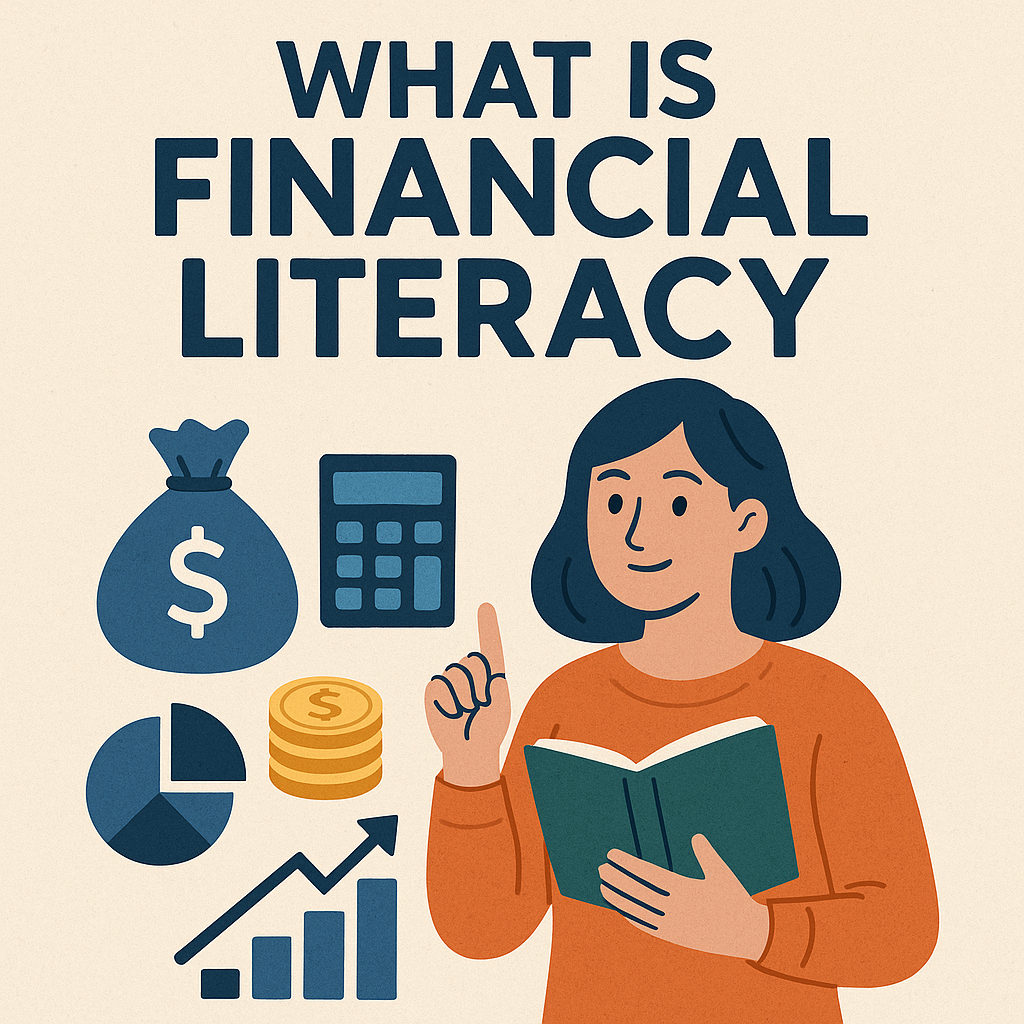Financial literacy isn’t just about understanding numbers — it’s about having the confidence and knowledge to make decisions that improve your financial well-being. Whether you’re trying to pay off debt, build savings, or start investing, financial literacy is the foundation that empowers you to achieve your goals and build a secure future.
In this article, we’ll explore what financial literacy really means, why it matters, and how even small improvements in your financial knowledge can change your life.
Understanding Financial Literacy
Financial literacy is the ability to understand and effectively use various financial skills, including:
- Budgeting
- Saving
- Managing debt
- Investing
- Understanding interest rates
- Making informed financial decisions
It’s about being able to read and understand a bank statement, know the risks of a loan, or compare financial products like credit cards or insurance.
Without financial literacy, people are more likely to make poor money choices that can lead to long-term consequences such as debt, stress, and missed opportunities for wealth building.
Why Financial Literacy Matters
1. It Helps You Avoid Debt Traps
One of the most common consequences of poor financial literacy is falling into high-interest debt. Understanding how interest works, how to manage credit, and when to avoid loans can keep you out of financial trouble.
2. It Builds Financial Confidence
When you understand how money works, you’re less likely to feel anxious about it. You’ll make decisions with clarity — whether you’re buying a car, planning a vacation, or choosing an investment strategy.
3. It Prepares You for Emergencies
Life is unpredictable. Without emergency savings and a basic plan, even a small surprise expense — like a car repair — can throw your finances off balance. Financial literacy teaches you how to prepare for the unexpected.
4. It Supports Long-Term Goals
Whether it’s buying a home, funding a child’s education, or retiring comfortably, financial literacy helps you plan and work toward these goals. It also allows you to avoid common pitfalls that delay or derail progress.
Key Concepts Every Financial Beginner Should Know
Let’s break down some fundamental ideas that every financially literate person should understand:
Budgeting
Creating and maintaining a budget is essential. It helps you track your income and expenses, allocate money to savings, and prevent overspending. It’s your financial blueprint.
Saving and Emergency Funds
Learning how to save consistently — and knowing where to put your savings — is critical. Start by building a small emergency fund (at least $500 to $1,000), then expand it over time to cover 3–6 months of living expenses.
Debt Management
Not all debt is “bad,” but high-interest consumer debt (like credit cards) can destroy your financial health. Learn how to reduce and eventually eliminate these debts using methods like the debt snowball or avalanche strategy.
Compound Interest
This is one of the most powerful financial principles. Compound interest allows your money to grow over time. The earlier you start saving or investing, the more your money will multiply — even with small contributions.
Investing Basics
Investing is not just for the rich. Understanding simple investment tools like mutual funds, ETFs, and retirement accounts (like a 401(k) or IRA) can open doors to wealth creation. Learn about risk tolerance, diversification, and long-term strategy.
How to Improve Your Financial Literacy
You don’t need to become an expert overnight. Start with these steps:
1. Read Books and Blogs
Some beginner-friendly books include:
- The Total Money Makeover by Dave Ramsey
- Rich Dad Poor Dad by Robert Kiyosaki
- Your Money or Your Life by Vicki Robin
There are also countless blogs and YouTube channels dedicated to personal finance for beginners.
2. Take Free Courses
Many websites offer free courses on personal finance, including:
- Khan Academy
- Coursera
- edX
- Local government and nonprofit financial literacy programs
3. Use Budgeting Apps
Apps like Mint, YNAB, or GoodBudget can help you track your money and develop financial awareness with ease.
4. Talk About Money
Open conversations with trusted friends or mentors about money. Ask questions. Learn from their experiences and mistakes. Reducing the stigma around talking about finances is essential to growing your knowledge.
The Life-Changing Impact of Financial Literacy
Improving your financial literacy doesn’t just help your bank account — it affects your entire life:
- Mental health: Less stress about bills and emergencies
- Relationships: Fewer conflicts over money
- Career: More confidence in negotiating salaries or managing business finances
- Freedom: The ability to make life choices not based solely on financial necessity
You’ll be able to stop living paycheck to paycheck and start living with intention and purpose.
You’re the CFO of Your Life
Think of your personal finances as a business — and you are the CFO. Every decision you make has consequences. With greater financial literacy, you become more equipped to manage your “company” efficiently, grow its assets, and plan its future.
No matter where you’re starting from, it’s never too late to learn. Just by reading this article, you’re taking a step toward financial empowerment. Keep going — your future self will thank you.
